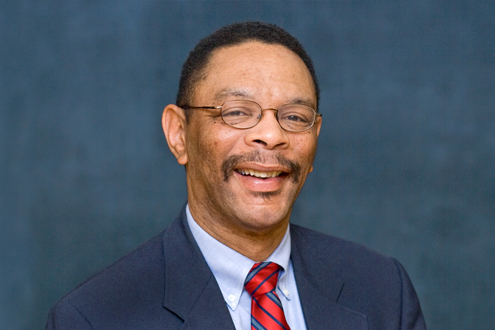
Michael Elliott, associate dean and director of undergraduate studies at UMSL, has been named the business college’s interim dean. (Photo by August Jennewein)
Michael Elliott, associate dean and director of undergraduate studies for the College of Business Administration at the University of Missouri–St. Louis, was named interim dean of the college.
Elliott, who began as interim dean on July 1, will fill the position left by Keith Womer, who has now returned to the classroom. The selection process to appoint a new dean is under way.
“The search for a new dean of the College of Business Administration is nearing its conclusion and we expect to announce a new dean shortly,” said Glen Cope, provost and vice chancellor for academic affairs at UMSL. “Dr. Elliott has been named interim. I’m very pleased that he is willing to serve in this capacity to lead the college until the new dean arrives on campus. I hope you will all join me in assisting Dr. Elliott in this interim role in support of the college.,”
Elliott joined UMSL in 1990 as assistant professor of marketing in the College of Business Administration. In 1998 he was promoted to associate professor, and in 2008 he became associate dean and director of undergraduate studies at UMSL.
He earned bachelor’s and master’s degrees from the University of Mississippi in Oxford and doctorate degree in marketing from Mississippi State University in Starkville.
He is an expert in marketing and has published extensively on consumer behavior, product placement advertising effectiviness. During his administrative term at UMSL, Elliott implemented new advising software to improve communication between adviser and students, reorganized the advising staff, created focal areas for advising staff and initiated an introductory business course for freshmen.
Elliott talked with UMSL Daily about the future of the College of Business Administration.
What have been some of the biggest changes you’ve seen in higher education since joining UMSL’s College of Business Administration?
In my opinion, the escalating cost of tuition has been the biggest challenge to delivering value to our students. In addition to the fact that college courses costs over $1,000 at many institutions and the price of textbooks are skyrocketing to the point that students either rent them or try to go without. As administrators, we see students having to work more hours per week. Of course, this leads to less time to spend on coursework. It’s a vicious cycle.
Over the last 10 years the college has undergone many changes, what do you feel has been the most important?
The biggest accomplishment in the past few years has been our fundraising effort, especially the new building project. We see the building as the nexus of our brand-building efforts. When funding is secured and construction completed, the new business building will be an engaging learning environment for our students and a place where our alumni and corporate partners will feel at home.
Going forward, what do you see as being the three main areas of focus for the college?
I see several opportunities for the college. I envision a series of student-centered collaborations with the St. Louis community that includes service-learning projects, career workshops and more internship or scholarship opportunities. We expect our top ranked international business program to grow in prominence as we develop more international partnerships with top universities in Europe and Asia. In my opinion, the greatest growth opportunity for the college is reaching out to underserved student markets (e.g., adult and distance learners). UMSL now has the online course delivery systems that can deliver quality programs and shorten the time to degree completion.
What challenges are faced by the college in order to compete with other programs?
Historically, UMSL has held a strong market position as the highest-ranked public institution in the St. Louis region. It is viewed as a better educational value than many of the private institutions. Unfortunately, we face shrinking financial support from the state for our programs. This lack of support places upward pressure on our tuition costs that are passed on to students. The good news is that our university, especially the College of Business Administration, is adapting and finding alternative sources of funding to support our missions of instruction, research and community service.
What qualities will the new dean need in order to be successful in leading the college?
Like any chief executive officer, the new dean will need to possess a set of key skills from his or her education including leadership, critical thinking, creativity, ethics, global perspective and cultural awareness. Deans must be strategic thinkers and leaders. They must be able to size up the capabilities of each department, analyze where the school’s strengths and opportunities lie, and formulate strategic plans, again all done while balancing multiple “customers.” As an example, MBA enrollments nationally have been flat. Creative business school deans are growing their programs overseas and developing more innovative, differentiated programs with clear value propositions for students, donors and recruiters.
Media Coverage:
Florissant (Mo.) Patch














